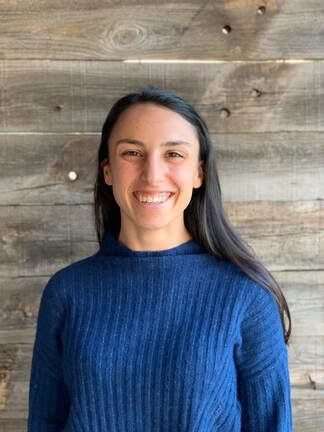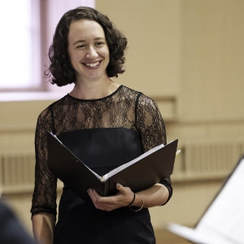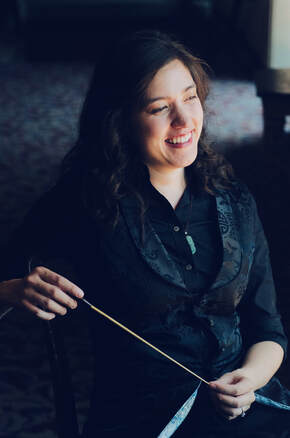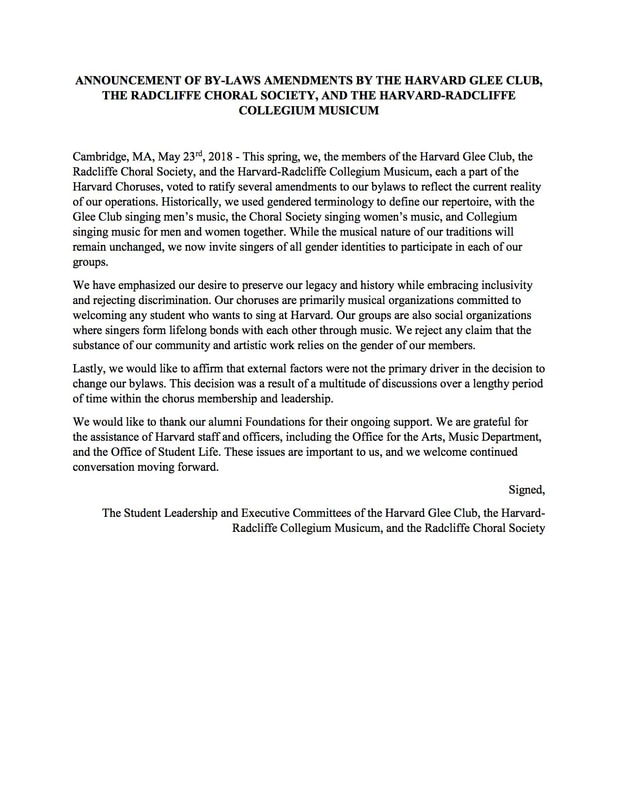|
The Harvard Choruses and Office for the Arts at Harvard are thrilled to announce the appointment of Dr. Hana Cai as the Associate Director of Choral Activities at Harvard. Dr. Cai assumes this role on July 1, 2024.
"I was immediately impressed with Hana’s credentials, specifically her expertise with treble voices and choirs as well as her experiences and efforts in the DEIB space. Upon meeting Hana, I was drawn in by her ability to make immediate connections, quiet confidence, refined talent, and relationship with the music. The search committee is confident that Hana will be an excellent partner to current leadership and help to propel and enhance an already exceptional program. On behalf of the alums of the Harvard choruses, I enthusiastically welcome Hana and am excited for the future of the Harvard Choral program and my younger brothers and sisters in song as Hana assumes her new role." Plena - Diana Sáez Ithaca College Treble Chorale Dr. Hana Cai, conductor Sona Minasian, piano Ellie Shanton, güiro Brayden Reed, congas In this newly created position, Dr. Cai will collaborate with Andrew Clark, the Director of Choral Activities, and Olivia Porada, the Administrative Manager for Choral Music, in artistic, pedagogical, and administrative leadership of the Harvard Choral Program. Dr. Cai will serve as the principal conductor of the Radcliffe Choral Society (RCS), lead performance projects of the combined Harvard Choruses and serve as the Director of the Holden Voice Program. She will also share conducting leadership of Collegium and the Harvard Glee Club with Andrew Clark. "I am thrilled to be joining the Harvard Choruses next year as the Associate Director of Choral Activities alongside my wonderful colleague, Andrew Clark. The Harvard Choruses hold an incredible history in the world of collegiate choral music and I look forward to working with Andrew to honor that history while also envisioning the future with the ensembles" "As we began this search process, many trusted colleagues and mentors around the country enthusiastically recommended Hana Cai. Having witnessed her superb musicianship, skillful conducting, and first-rate teaching, I could not be more excited to partner with her in leading the Harvard Choral Program. Her integrity, passion, intellect, and varied interests made an immediate impact on our students; Hana will no doubt contribute a great deal to the exciting future trajectory of choral music at Harvard." Dr. Cai holds a BM in piano performance and a BA in Chinese from the University of Maryland, College Park, an MM in conducting from the Eastman School of Music, and a doctorate in choral conducting from the Jacobs School of Music at Indiana University. She currently serves as the Associate Director of Choral Activities at Lehigh University and has previously been a faculty member at Ithaca College. "The Harvard Choruses are extremely excited to welcome Hana Cai as the Associate Director of Choral Activities. We are excited for the many talents, knowledge, and enthusiasm Hana will bring to this position and the Harvard Choruses. During our discussions with Hana, the student search committee was impressed with her poise and passion for vocal pedagogy, making music accessible to all experience levels, and her commitment to diversity, equity, and inclusion. We believe she will be a wonderful leader for the Harvard Choral community and empower students as singers and leaders in student management. On behalf of the students of the Harvard choruses, we welcome Hana with open arms to the Harvard Chorus community!" The Harvard Choruses and Office for the Arts at Harvard are thrilled to announce the appointment of Olivia Porada as the Administrative Manager for Choral Music at Harvard. Porada assumes this newly-created, full-time role on October 16, 2023.  Olivia Porada Olivia Porada Olivia Porada is an experienced and talented arts administrator, a classical singer and, in her free time, a cardio kickboxing instructor. How do these things impact her work? In her words, "they create discipline and focus, allow for creativity, showcase strength and stamina, and foster empathy and passion." She plans to bring all of this and more to her work as the Administrative Manager for Choral Music at Harvard. Porada will partner with Andrew Clark, Harvard's Director of Choral Activities, in leading the Harvard Choral Program and work closely with the choral staff, student leaders, and other colleagues at the Office for the Arts and the Department of Music. She will officially join the Harvard choral community on October 16, 2023. "I am thrilled to welcome Olivia to our team and look forward to working together on the next chapter of choral music at Harvard," said Clark. "Olivia's impressive experience as a strategic arts leader, academic administrator, and performing artist will be great assets for our choral program. We are so fortunate to gain from her perspectives and expertise as well as her deep passion for her work. Through our search process, we sought to find the ideal partner to develop more efficient structures of support as well as someone to serve as a primary mentor to the student leaders of our 501(c)(3) non-profit choral ensembles. We found this dynamic partner in Olivia and I could not be more excited about our future work together." "The student managers are thrilled to welcome Olivia Porada as our administrative leader," said search committee member and Radcliffe Choral Society manager, Hannah Boen '25. "Over the years, the role of Choral Administrator has grown alongside the Harvard Choruses, and having a dedicated full-time staff member will significantly enhance the experience for student leaders and singers alike. During our discussions with Olivia, we were impressed by her focus and commitment to arts administration. We believe she is the right person to empower student leaders, safeguard our priorities, and provide unwavering support when needed. On behalf of the students, we warmly welcome Olivia to the Harvard Choruses!" a welcome message from olivia poradaPreviously, Olivia worked at New England Conservatory as the Production and Administrative Director for Jazz and Contemporary Musical Arts and at Boston University Tanglewood Institute as the Director of Recruitment and Program Operations. In both organizations, she excelled in working with artists of all ages, at all levels, and from around the world.
Porada is a proud alumna of Boston University and The College of New Jersey where she earned a Master of Science in Arts Administration and Bachelor of Arts in Vocal Performance, respectively. In her free time, when she’s not teaching a cardio kickboxing class, she enjoys traveling with her husband, cooking delicious meals, and spending time with her family. Originally published by The Harvard Glee Club Foundation - https://hgcfoundation.org/holden-voice-program  Elizabeth Eschen, Director of the Holden Voice Program Elizabeth Eschen, Director of the Holden Voice Program For sixty years, Harvard Glee Club alumni (and, more recently, former members of the Radcliffe Choral Society and Harvard-Radcliffe Collegium Musicum) have provided singers from the Harvard Choruses with the unique opportunity to take private voice lessons at significantly reduced cost. Last year, nearly forty undergraduates from the Harvard Choruses participated in the Holden Voice Program. Each semester, students had ten 45-minute sessions with one of five master teacher-artists from whom students learned proper vocal technique, gained familiarity with vocal repertoire, and developed their personal musicianship. Between 50 and 70 percent of the $720 per person cost for a semester of lessons (based largely on financial need) was covered by funding provided by the three Harvard Chorus Foundations (as well as Harvard’s Office for the Arts) with annual support from the Glee Club Foundation alone covering upwards of 55% of the total program costs. Since 2015, the Holden Voice Program has been ably-led by Elizabeth Eschen. A graduate of Providence College (B.A. in Vocal Performance and English) and Boston University (M.M. in Choral Conducting), Eschen is not only a vocal pedagogue but also an active singer and vocal soloist who performs regularly with groups such as Boston Baroque, Music at Marsh Chapel, the Cantata Singers, and Bach Akademie Charlotte. She is also a founding member of the Lorelei Ensemble, the Boston-based choir committed to advancing and elevating women’s vocal ensembles and enriching the repertoire through forward-thinking and co-creative collaboration Under Eschen’s leadership, the Holden Voice Program has expanded beyond private voice lessons to now provide students with a host of other opportunities to practice and perform. In addition to the traditional spring recital, student performers can now share the fruits of their labors with friends and family at a fall recital and a spring senior showcase and with their peers at studio classes led by each of the Program’s instructors. In addition, Eschen has sought out a diverse range of collaborators across the Harvard campus to host student performances. Last fall, for example, Program participants performed Edward Killenyi’s Mexican Folk Song Settings at Harvard’s Peabody Museum of Archaeology and Ethnology as part of the museum’s Day of the Dead celebration. For participating students, the Voice Program is an indispensable resource. Several recent graduates of the Program have gone on to sing professionally or semi-professionally. Among these is Billy Gardner ’17, former Glee Club Manager, who studied with Harris Ipock, past Resident Conductor of the Glee Club, for four years. Of his time in the Program, Gardner notes how the Voice Program was “an integral part of my singing experience at Harvard and participation in the Harvard Choruses.” He goes on to state: “because of the Program, I was able to receive voice lessons from high-quality teachers at an affordable cost, something I probably wouldn’t have been able to do if not for the financial support.” While Program participation led Gardner to a desire to sing professionally, other Glee Club members have taken lessons to feed their strong avocations. Current Glee Club Financial Manager Michael Horton ’20 started in the Program in his freshman year, having never taken vocal lessons before. He notes: “While I have been singing in a chorus for most of my life, taking lessons has allowed me to hone my ability as a soloist. The lessons remind me how I often get complacent when singing. Things like breath control and timbre were always at the back of my mind before, but I have now started to understand the juggling act required for great singing.” While not aspiring to a career at the Met, voice lessons and participation in studio classes and recitals have nonetheless made Horton “much more confident in controlling how my voice sounds which has not only impacted my solo performances but also helps me sing in any setting.” Asked about what the future holds for the Holden Voice Program, Eschen expresses the hope that the Program will soon accommodate upwards of sixty participants each semester. In her ideal Harvard, students would have the opportunity to concentrate in Voice and even audition for vocal masters’ programs. Her more immediate goals, however, include building the Program into a more integrative academic framework, suffusing students’ total singing lives with an appreciation for technique and an expanded vocal repertoire. Eschen regards Dr. Andrew Clark, Harvard’s Director of Choral Activities, as an ideal partner in striving to reach these goals in that both come from a similar foundation of, as she puts it, “believing in healthy vocalization,” both being teachers at heart, passionate about both vocal music and vocal pedagogy. As the Holden Voice Program has continued to push the boundaries and challenge student performers, the Harvard Glee Club Foundation has likewise challenged itself to increase its support for this worthwhile endeavor. We welcome more alumni to help us continue to serve Harvard’s singers so well. HOLDEN VOICE PROGRAM - PROGRAM OF EVENTS FOR 2018-2019 Nov. 1, 2018 - Day of the Dead Performance 4:00 - 5:30 PM - Peabody Museum of Archeology & Ethnology, Harvard University Dec. 10, 2018 - Fall Recital 7:00 PM - Holden Chapel, Harvard University April 26, 2019 - Master Class (with members of Calliope’s Call) 7:00 PM - Holden Chapel, Harvard University May 5, 2019 - Spring Recital 2:00 PM - Holden Chapel, Harvard University May 7, 2019 - Senior Showcase 7:00 PM - Holden Chapel, Harvard University “Little Shards of Dissonance” An oratorio adapted from Langston Hughes by Sophia Nguyen September-October 2018 https://harvardmagazine.com/2018/09/davone-tines-michael-schachter At some point, while preparing for the Rockport Chamber Music Festival, Davóne Tines ’09 and Michael Shachter ’09 were freshly struck by their circumstances. Their piece Were You There, a musical meditation on racial violence, starts with Handel and ends with Tines inviting the audience to join him in singing “We Shall Overcome.” The friends were rehearsing in the Massachusetts town’s soaring concert hall, its entire back wall made of glass. Out that window they could see people partying on Cape Ann, enjoying the water, celebrating the Fourth of July.
“Davóne and I had a moment when we looked at each other,” Schachter recalls. “We’re singing about police brutality, and we’re amidst a lot of wealth and people who could go through years of their lives without confronting—not only any racialized violence, but literally any other races. We felt like, it’s bizarre—we have to be messengers or evangelists for something that people might otherwise have no real need to confront.” This is a contrast they’ve grown familiar with, as creators of classical music: presenting art about injustice in gracious venues. It’s one they’ll likely face again with their next collaboration: The Black Clown, with music by Schachter and its title role sung by Tines, adapts text by Langston Hughes for the stage, and will open the American Repertory Theater’s (A.R.T.) new season. The poem is obscure, its structure strange. Introducing it as “a dramatic monologue to be spoken by a pure-blooded Negro in the white suit and hat of a clown, to the music of a piano, or an orchestra,” Hughes lays out the text in two columns. “The Poem” contains the Clown’s lines, and “The Mood”—itself a kind of lyric verse—provides cues like, “A gay and low-down blues,” or “Flinching under the whip.” Mourning his position as “the fool of the whole world,” the narrator recounts the history of slavery and “the long struggle for life” in its wake. Schachter and Tines, who met in the Harvard-Radcliffe Collegium Musicum, began the project at a tumultuous time for both. In 2010, Tines was working various gigs, including singing in the choir of the National Shrine in Washington, D.C.; during a lull in rehearsal he emailed Schachter to propose collaborating on something new. Schachter, who’d landed at the University of Michigan’s master’s program in composition after a year studying music in India, had recently read Hughes’s poem. They decided to set it to music. By 2012, Schachter had sketched out some ideas while writing for the Michigan orchestra. Tines, meanwhile, had enrolled at and grown frustrated with Juilliard, where the faculty kept changing their assessments of his vocal range—a bass-baritone with an equally strong falsetto—and what repertoire he should train in. For a spell after his 2013 graduation, he thought he might go into artist management instead. Eventually the friends developed a 20-minute song cycle from the Hughes poem, thinking they might record an album or perform it in concert (“with Davóne in a tux, and his hand on the piano,” says Schachter). Things accelerated when, in 2015, Tines joined the A.R.T.’s production of the Civil War opera Crossing, in a role written for him by his friend Matt Aucoin ’12. Schachter and Tines performed the cycle for the A.R.T.’s producers, who said they were interested in it—but as an evening-length work. Now, some eight years since that first email exchange, Schachter is working on various choral and orchestral commissions and a monograph on musical aesthetics; Tines has a densely booked performance schedule, including roles in new operas by John Adams ’69, A.M. ’72, D.Mus. ’12, and Kaija Saariaho. And The Black Clown, running about 80 minutes, will premiere with a cast of 13 and an orchestra of 10, using dance-band era techniques like growling and sliding. Even as the production expanded, they hewed to the original text, says Schachter: “We treated it in a way that is more typical of a Handel oratorio.” The Messiah, for example, tells a single, simple narrative, but “You create power through repetition and cyclical musical behavior, within a pocket of the story.” They call theirs a “vaudeville oratorio.” It jumps through different genres—from blues narratives, which use a 12-bar form and nested repetition to drive at a musical idea, to South Indian music, where the text repeats, rising in pitch and complexity—to sound out the idea of inheriting oppression across generations. The only other lyrics come from spirituals specified by Hughes in “The Mood”: “Sometimes I Feel Like a Motherless Child” and “Nobody Knows the Trouble I’ve Seen.” The influence of religious music is also on full display in the oratorio’s climax, which builds on gospel idioms. The Clown’s declaration—“Rise from the bottom,/Out of the slime!/Look at the stars yonder/Calling through time!”—is set to a standard chord progression (a two chord, a four, then a five, resolving on a one). It then repeats at double speed, then triple, then sextuple, overlaid with new harmonic layers. “The last time, you hear these supervening chords, which are quite dissonant, underneath the structure. Davóne and I nicknamed them ‘space chords,’” Schachter explains. “It’s this otherworldly, not quite human glint of light that’s cascading on the whole thing.” “We get to have fun with plumbing the depths of that cadence,” adds Tines. “Really stretching it out, to further illuminate what Hughes is trying to say: We are subjects of an entire lineage of oppression, but we can look to the stars out yonder. We are calling from all of time, for all that we’ve been through, and all that we hope might come.” Schachter says, “Getting to that point took us literally years,” much of it spent deciding how to interpret the poem’s ending lines: “I was once a black clown/But now—/I’m a man!” “Is his journey a success? Is it something that’s a personal success amidst a larger futility?” asks Tines. The creators don’t want to give away the oratorio’s ending—but what they say about the score offers hints. Even the biggest and most up-tempo chords, swelling with emotional catharsis, are embedded with what the composer calls “little shards of dissonance.” “I wanted to get this feeling that though we’re in a certain present, we can’t escape the past,” Schachter says. “That we’re in these histories that brought us to where we are now.” |




